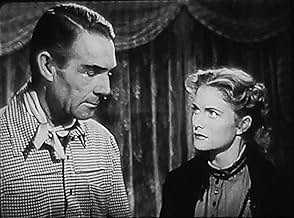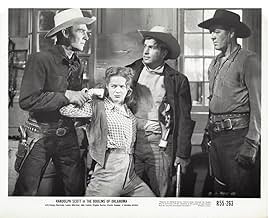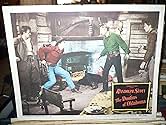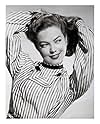CALIFICACIÓN DE IMDb
6.5/10
693
TU CALIFICACIÓN
Bill Doolin, ex miembro de la banda Dalton, forma su propia banda de ladrones de bancos, pero los alguaciles federales se están acercando.Bill Doolin, ex miembro de la banda Dalton, forma su propia banda de ladrones de bancos, pero los alguaciles federales se están acercando.Bill Doolin, ex miembro de la banda Dalton, forma su propia banda de ladrones de bancos, pero los alguaciles federales se están acercando.
Robert Barrat
- Marshal Heck Thomas
- (as Robert H. Barrat)
Jock Mahoney
- Tulsa Jack Blake
- (as Jock O'Mahoney)
Stanley Andrews
- Coffeyville Sheriff
- (sin créditos)
Gertrude Astor
- Saloon Girl
- (sin créditos)
Trevor Bardette
- Ezra Johnson - Farmer
- (sin créditos)
George Bell
- Minor Role
- (sin créditos)
Stanley Blystone
- Jailer
- (sin créditos)
- Dirección
- Guionista
- Todo el elenco y el equipo
- Producción, taquilla y más en IMDbPro
Opiniones destacadas
Good Scott western, with lots of action, interesting characters, and a solid script. Doolin (Scott) may be a bankrobber but he's also capable of noble deeds. In short, he's a good-bad guy of the sort the iron-jawed Scott could play to perfection. Here he leads a gang of outlaws whose members are known to us by name. Funny thing about the movies. Even bad guys can be humanized enough so that we care about them. That happens more or less with these gang members.
And get a load of the familiar Alabama Hills that Scott and Buddy Boetticher explored in their great Ranown series of oaters. Director Douglas does some effective staging with the Neolithic slabs, worthy of Boetticher. There're some other good touches by Douglas. I especially like the little boy who stares Scott down in church. I don't think I've seen anything quite like it. Surprisingly, veteran screen baddie George Macready plays a federal marshal, which took some getting used to. And what a sweetheart Virginia Huston is. Who wouldn't give up a life of crime for her. It's that element, I think, that lends the ending such poignancy.
All in all, it's a well done 90-minutes by Columbia, somewhere between an A-production and a B. I'm just sorry Scott never got the recognition as a western star that he deserved.
And get a load of the familiar Alabama Hills that Scott and Buddy Boetticher explored in their great Ranown series of oaters. Director Douglas does some effective staging with the Neolithic slabs, worthy of Boetticher. There're some other good touches by Douglas. I especially like the little boy who stares Scott down in church. I don't think I've seen anything quite like it. Surprisingly, veteran screen baddie George Macready plays a federal marshal, which took some getting used to. And what a sweetheart Virginia Huston is. Who wouldn't give up a life of crime for her. It's that element, I think, that lends the ending such poignancy.
All in all, it's a well done 90-minutes by Columbia, somewhere between an A-production and a B. I'm just sorry Scott never got the recognition as a western star that he deserved.
As has been generally observed, John Ford was making adult westerns long before the release of the high profile 'adult western' High Noon, and he was doing it under the radar of 99% of the critics of his day.
While no Ford, Gordon Douglas directed lots of highly watchable films that likewise never got their due in their time. Doolins is one of these. As a well-known director for hire, Douglas once credited the existence of his entire oeuvre to having a family to feed.
--Fair enough, and a pretty bravely self-deprecating and self-aware attitude in a town of pretentious auteur-wannabes. I'd offer the opinion that Douglas was the average intelligent man making films for his peers. Because of that, his films remain worth a sit-through. (His Kiss Tomorrow Goodbye rivals Walsh's White Heat in energy and noir viciousness as a late Cagney vehicle.)
This is the best Randolph Scott western after the Boetticher films. Place it alongside other fine non-Ford westerns of the era, including Angel and the badman, Winchester 73 and Yellow Sky. It's definitely worth a watch.
While no Ford, Gordon Douglas directed lots of highly watchable films that likewise never got their due in their time. Doolins is one of these. As a well-known director for hire, Douglas once credited the existence of his entire oeuvre to having a family to feed.
--Fair enough, and a pretty bravely self-deprecating and self-aware attitude in a town of pretentious auteur-wannabes. I'd offer the opinion that Douglas was the average intelligent man making films for his peers. Because of that, his films remain worth a sit-through. (His Kiss Tomorrow Goodbye rivals Walsh's White Heat in energy and noir viciousness as a late Cagney vehicle.)
This is the best Randolph Scott western after the Boetticher films. Place it alongside other fine non-Ford westerns of the era, including Angel and the badman, Winchester 73 and Yellow Sky. It's definitely worth a watch.
Randolph Scott usually has a bit of rogue in his characters but there's less of it here than usual. Scott is a member of a gang of thieves and barely escapes when the others are slaughtered by the U.S. Marshal, played by George MacReady who is a bad guy even when he's a good guy, as he is here. That was a close call, Scott reflects, and maybe it's time to hang up my sixguns and take up farming. Not only does he farm (corn) but he marries the daughter of the local church deacon. How good can you get?
Nothing good lasts, however, as anyone over the age of eight knows. His former buddies play a dirty trick on him and expose his identity as a bandit, forcing him to leave wife and home and take to the road again. The Doolin Gang isn't bad, as bank-robbing thieving murdering gangs go. None of them is really evil, although they have their differences. The movie differentiates them pretty well and gives us a chance to get to know them, weaknesses and virtues alike. They have colorful names which I can't remember exactly but are something like "Tulsa," "Brickbat," "Arkansas," "Little Billy." Little Billy is the educated one. He's been to school in Pennsylvania. You can tell because he can quote Benjamin Franklin. He's played in such an effete manner by Noah Beery, Jr., that one wonders if his character isn't one of those barely disguised gay people that some of the older movies used. In any case he does not utter one believable line. But Scott is pretty good, playing it so straight. And John Ireland is very watchable too. I don't know why, but I've always liked John Ireland even in villainous roles. The bridge of his nose seems to have caved in and drawn his eyes closer together. His best role was in "All the King's Men." He had a much more prominent part in "Red River" than we see on screen in today's prints. His role was cut to the bone by director Howard Hawks when Hawks found out that Ireland was romancing Hawks' girl friend at the time, who shall remain nameless here except for her real name -- Letitia laCock -- which wasn't made up by Andy Warhol.
Where was I? Oh, yes, Scott's pretty good. I enjoyed him in his earlier movies, "My Favorite Wife" and "Follow the Fleet," where he established and retired the world's record for repeating the word "swell" on screen. There was a considerable hiatus in his career while he played replaceable heroes in replaceable Westerns, until he made "Ride the High Country" for Sam Peckinpah. He was genuinely good in that -- all rogue, from beginning to end.
Nothing good lasts, however, as anyone over the age of eight knows. His former buddies play a dirty trick on him and expose his identity as a bandit, forcing him to leave wife and home and take to the road again. The Doolin Gang isn't bad, as bank-robbing thieving murdering gangs go. None of them is really evil, although they have their differences. The movie differentiates them pretty well and gives us a chance to get to know them, weaknesses and virtues alike. They have colorful names which I can't remember exactly but are something like "Tulsa," "Brickbat," "Arkansas," "Little Billy." Little Billy is the educated one. He's been to school in Pennsylvania. You can tell because he can quote Benjamin Franklin. He's played in such an effete manner by Noah Beery, Jr., that one wonders if his character isn't one of those barely disguised gay people that some of the older movies used. In any case he does not utter one believable line. But Scott is pretty good, playing it so straight. And John Ireland is very watchable too. I don't know why, but I've always liked John Ireland even in villainous roles. The bridge of his nose seems to have caved in and drawn his eyes closer together. His best role was in "All the King's Men." He had a much more prominent part in "Red River" than we see on screen in today's prints. His role was cut to the bone by director Howard Hawks when Hawks found out that Ireland was romancing Hawks' girl friend at the time, who shall remain nameless here except for her real name -- Letitia laCock -- which wasn't made up by Andy Warhol.
Where was I? Oh, yes, Scott's pretty good. I enjoyed him in his earlier movies, "My Favorite Wife" and "Follow the Fleet," where he established and retired the world's record for repeating the word "swell" on screen. There was a considerable hiatus in his career while he played replaceable heroes in replaceable Westerns, until he made "Ride the High Country" for Sam Peckinpah. He was genuinely good in that -- all rogue, from beginning to end.
Bill Doolin was an outlaw operating in Oklahoma territory in the 1890s who was captured in 1896 by a devoted lawman named Bill Tilghman who had spent four years doggedly pursuing him. Doolin escaped from prison but was eventually shot down by a U.S. Marshal named Heck Thomas. In THE DOOLINS OF OKLAHOMA (1949), Doolin is played as something of a "good" outlaw by Randolph Scott. He's tall, handsome, polite to civilians, and blessed with a remarkable degree of self-control. He even goes straight at one point and marries a pretty, loving farm girl (Virginia Huston) and starts up a working farm. But, unfortunately, he gets pulled back into the outlaw life. As directed by Gordon Douglas, the film offers several bursts of exciting, well-staged western action, including lots of chases on horseback and some amazing feats of horsemanship. Scott is doubled in the long shots, but he does his own furious riding in medium-shot. Most of the chase scenes appear to have been shot in the familiar rocky terrain around Lone Pine, California, at the foot of the Sierras, a dramatic landscape perfect for such scenes, even if it looks nothing like Oklahoma.
Western buffs will enjoy the way the film incorporates other historical western figures, including a couple who had later movies of their own. At the beginning we see the Dalton gang carry out the famed disastrous raid on Coffeyville, Kansas, a fiasco that only Doolin survives because his horse went lame at the last minute (which matches the account of the raid supplied in the book, "Bill Tilghman, Marshal of the Last Frontier," by Floyd Miller). The Dalton gang, of course, has been the subject of many westerns. Later in the film, after Doolin has recruited various gang members, they all adopt the habit of hiding out between jobs in the wide open town of Ingalls, where one of the gang, Bitter Creek (John Ireland), has a girlfriend. She is called Rose of Cimarron and is played in a mature, elegant fashion by Louise Allbritton (SON OF Dracula). One of the characters we meet in Ingalls is a spunky little two-fisted, sharp-shootin' teenage cowgirl named Cattle Annie who wants to join the gang and is well-played by Dona Drake (who was 35 at the time!). A later western, ROSE OF CIMARRON (1952), starred Mala Powers in the title role and I remember her as quite a fiery display of dark-eyed female outlawry. In 1980, there was a film called CATTLE ANNIE AND LITTLE BRITCHES, which starred Amanda Plummer as Cattle Annie, Burt Lancaster as Bill Doolin, and Rod Steiger as Bill Tilghman.
There's a U.S. Marshal in this film named Sam Hughes who pursues Doolin for nearly all of the film's 90 minutes. He appears to be based on Tilghman. Why the name change when Marshal Heck Thomas is left intact, I can't say. Hughes is played by George Macready and Thomas is played by Robert Barrat. Tilghman, one of the most daring of western lawmen, was played by name in only two films I know of, the aforementioned CATTLE ANNIE and the TV movie, YOU KNOW MY NAME (1999), which starred Sam Elliott. The book I mentioned, "Bill Tilghman, Marshal of the Last Frontier," by Floyd Miller (Doubleday, 1968), is highly recommended if you want to read a vivid account of a real western lawman's exciting career. As for this movie, I would urge you not to expect the most accurate portrayal of events, but to take it as a piece of solid, well-crafted western entertainment, with an above-average cast and an attention to details normally left out of studio westerns.
Western buffs will enjoy the way the film incorporates other historical western figures, including a couple who had later movies of their own. At the beginning we see the Dalton gang carry out the famed disastrous raid on Coffeyville, Kansas, a fiasco that only Doolin survives because his horse went lame at the last minute (which matches the account of the raid supplied in the book, "Bill Tilghman, Marshal of the Last Frontier," by Floyd Miller). The Dalton gang, of course, has been the subject of many westerns. Later in the film, after Doolin has recruited various gang members, they all adopt the habit of hiding out between jobs in the wide open town of Ingalls, where one of the gang, Bitter Creek (John Ireland), has a girlfriend. She is called Rose of Cimarron and is played in a mature, elegant fashion by Louise Allbritton (SON OF Dracula). One of the characters we meet in Ingalls is a spunky little two-fisted, sharp-shootin' teenage cowgirl named Cattle Annie who wants to join the gang and is well-played by Dona Drake (who was 35 at the time!). A later western, ROSE OF CIMARRON (1952), starred Mala Powers in the title role and I remember her as quite a fiery display of dark-eyed female outlawry. In 1980, there was a film called CATTLE ANNIE AND LITTLE BRITCHES, which starred Amanda Plummer as Cattle Annie, Burt Lancaster as Bill Doolin, and Rod Steiger as Bill Tilghman.
There's a U.S. Marshal in this film named Sam Hughes who pursues Doolin for nearly all of the film's 90 minutes. He appears to be based on Tilghman. Why the name change when Marshal Heck Thomas is left intact, I can't say. Hughes is played by George Macready and Thomas is played by Robert Barrat. Tilghman, one of the most daring of western lawmen, was played by name in only two films I know of, the aforementioned CATTLE ANNIE and the TV movie, YOU KNOW MY NAME (1999), which starred Sam Elliott. The book I mentioned, "Bill Tilghman, Marshal of the Last Frontier," by Floyd Miller (Doubleday, 1968), is highly recommended if you want to read a vivid account of a real western lawman's exciting career. As for this movie, I would urge you not to expect the most accurate portrayal of events, but to take it as a piece of solid, well-crafted western entertainment, with an above-average cast and an attention to details normally left out of studio westerns.
The Doolins of Oklahoma (AKA: The Great Manhunt) is directed by Gordon Douglas and written by Kenneth Garnet. It stars Randolph Scott, George Macready, Louise Albritton, John Ireland, Noah Beery Junior, Charles Kemper and Viginia Huston. Music is by George Duning and Paul Sawtell and cinematography by Charles Lawton Jr.
After the fall of the Dalton Gang, Bill Doolin (Scott) becomes head of his own gang of outlaws. But with the law in hot pursuit and his yearning to start a new life, Doolin knows he is greatly up against it.
Since it irritates many, it needs pointing out that if you are searching for a history lesson - a film full of real life fact - then look elsewhere. This is at best an interpretation of Bill Doolin the outlaw, where the makers get some things right and others not so. So just settle in for a Western movie, out to entertain with that bastion of Western, Randy Scott, up front and central.
Standard rules of 1940s/50s Westerns apply, meaning there is nothing new across the dusty plains here, outlaw wants to escape his past but circumstances refuse to let him do so. Cue moral and emotional conflict, chases, fisticuffs, shootings, robberies and macho posturing. The Doolin gang are here portrayed as lovable rogues, with main man Bill particularly exuding that fact, and it's here where the Production Code tempers the promise of something more biting in narrative thrust. The lady characters are unfortunately short changed in the writing, leaving the guys to carry the pic to safety conclusion.
At production level there is much to admire. Lawton's black and white photography is crisp and detailed, the interiors atmospherically photographed, the exteriors gorgeously showcasing the Calif locations to full effect. Stunt work (with legendary Yakima Canutt on point detail) is high grade, exciting and authenticity rolled into one. While the crowning glory comes with the stampede at pic's finale, exhilarating is not overstating it. Cast can't be faulted, the ever watchable Scott surrounding by genre pros who don't know how to soil a Western, and with Douglas in the director's chair you got a man who knows his way around an honest Oater.
No pulling up of trees here, and some familiarity does do it down for those in tight with the genre, but lots to like here. From the gunny opening salvo to the mighty stampede, and encompassing rueful closings, it's a treat regardless of historical lessons. 7/10
After the fall of the Dalton Gang, Bill Doolin (Scott) becomes head of his own gang of outlaws. But with the law in hot pursuit and his yearning to start a new life, Doolin knows he is greatly up against it.
Since it irritates many, it needs pointing out that if you are searching for a history lesson - a film full of real life fact - then look elsewhere. This is at best an interpretation of Bill Doolin the outlaw, where the makers get some things right and others not so. So just settle in for a Western movie, out to entertain with that bastion of Western, Randy Scott, up front and central.
Standard rules of 1940s/50s Westerns apply, meaning there is nothing new across the dusty plains here, outlaw wants to escape his past but circumstances refuse to let him do so. Cue moral and emotional conflict, chases, fisticuffs, shootings, robberies and macho posturing. The Doolin gang are here portrayed as lovable rogues, with main man Bill particularly exuding that fact, and it's here where the Production Code tempers the promise of something more biting in narrative thrust. The lady characters are unfortunately short changed in the writing, leaving the guys to carry the pic to safety conclusion.
At production level there is much to admire. Lawton's black and white photography is crisp and detailed, the interiors atmospherically photographed, the exteriors gorgeously showcasing the Calif locations to full effect. Stunt work (with legendary Yakima Canutt on point detail) is high grade, exciting and authenticity rolled into one. While the crowning glory comes with the stampede at pic's finale, exhilarating is not overstating it. Cast can't be faulted, the ever watchable Scott surrounding by genre pros who don't know how to soil a Western, and with Douglas in the director's chair you got a man who knows his way around an honest Oater.
No pulling up of trees here, and some familiarity does do it down for those in tight with the genre, but lots to like here. From the gunny opening salvo to the mighty stampede, and encompassing rueful closings, it's a treat regardless of historical lessons. 7/10
¿Sabías que…?
- TriviaBill Doolin's character was evoked thirty years later in Lamont Johnson's "Cattle Annie and Little Britches", featuring Burt Lancaster as Doolin.
- ErroresEmmett Dalton wasn't killed in 1892 after the attempted Coffeyville bank robbery. He actually died in 1937, after becoming a writer and actor.
- Citas
Bill Doolin: I see you still have the habit of sleeping outside.
Thomas 'Arkansas' Jones: Yeah, you live longer that way. See, when the shooting starts, I don't have to stop to open the door.
- ConexionesEdited from Los desalmados (1943)
Selecciones populares
Inicia sesión para calificar y agrega a la lista de videos para obtener recomendaciones personalizadas
- How long is The Doolins of Oklahoma?Con tecnología de Alexa
Detalles
- Fecha de lanzamiento
- País de origen
- Idioma
- También se conoce como
- The Doolins of Oklahoma
- Locaciones de filmación
- Productora
- Ver más créditos de la compañía en IMDbPro
- Tiempo de ejecución
- 1h 30min(90 min)
- Color
- Relación de aspecto
- 1.37 : 1
Contribuir a esta página
Sugiere una edición o agrega el contenido que falta







































